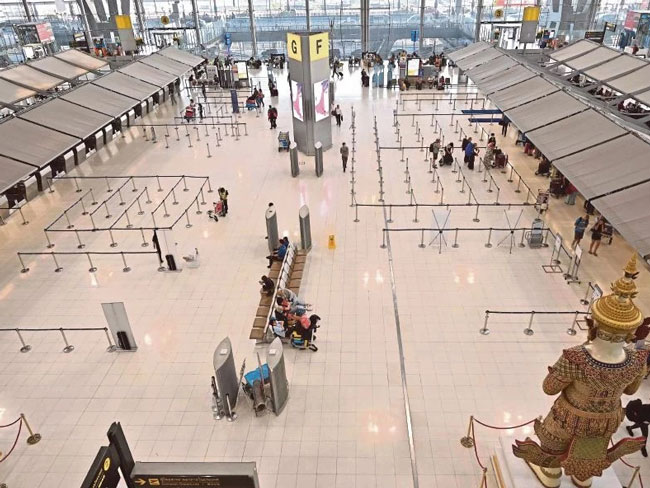Piyatida Wongjittapinyo has dreamt of seeing Japanese cherry blossoms in full bloom and so last year, she planned her trip to Tokyo and booked her flight nearly a year in advance. The 28-year-old was looking forward to embarking on that journey next month and making her dream come true.
But now her plans have come to a screeching halt.
Like many countries around the world, Japan is battling the outbreak of the potentially deadly COVID-19. And for Piyatida, it is too great a risk to spend a week there.
“I’m afraid I’d be a super spreader and shunned by society. Also at home, I’ve got my parents, who are more than 60 years old, and a young child. So, I decided against the trip,” she told CNA.
Piyatida has lost more than US$500 from non-refundable bookings. She said she decided to cancel her trip after hearing about a Thai couple who was infected with the coronavirus in Hokkaido. The Thai government has also advised the public to avoid unnecessary trips to several destinations affected by COVID-19. Tokyo is on that list.
“My company has introduced a rule that would require me to take 14 days of leave (after I return). That would also really affect my work,” she added.
Piyatida is one of several Thais forced to abandon their overseas trips for fear of the virus which has infected more than 90,000 people worldwide and killed more than 3000.
In Thailand, the outbreak has not only affected Thai travellers but also one of the country’s key sectors - tourism.

Almost empty Suvarnabhumi Airport at Bangkok during Covid-19 outbreak
According to the Tourism Ministry, in January, 3.81 million foreign tourists travelled to Thailand. While their arrivals indicated a 2.46 per cent increase from the same period last year, the number of Chinese tourists in particular dropped by 3.71 per cent, from 1.07 million to 1.03 million.
Chinese visitors account for the biggest group of tourists in Thailand. Their reduced arrivals were a result of the COVID-19 outbreak, according to Thailand’s Fiscal Policy Office, which reported a 1.1 percent fall in revenue from foreign tourists in January.
“The tourism sector continued to grow but the situation of the COVID-19 outbreak should be monitored as it has started to impact the Thai economy since the end of January,” said Wuttipong Jittungsakul, Deputy Director-General of the Fiscal Policy Office which comes under the Finance Ministry.
Since the outbreak, tourism operators in Bangkok’s commercial district have noticed a sudden drop in customers. The Erawan Shrine on Ratchadamri Road, which is usually crowded with tourists, was nearly deserted on Tuesday (Mar 3).
“The business is bad. I have almost zero customers these days,” said Pen Thepaksorn, 63, a flower seller near the Hindu shrine. Before the outbreak, she added, visitors would be in the hundreds and most of them were from Hong Kong.
The impact of COVID-19 is also felt among hoteliers in the Thai capital. Rei Matsuda, CEO of hotel chain Kokotel told CNA his business has been hit hard since the last week of January.
“It was a massive impact. In February 2020, our currently-operated portfolio hotels - 10 properties - overall had 28 per cent less revenue from the budgeted figure. This is a very painful figure,” he said.
“The most severely impacted one had 44 per cent less revenue from the budget of February 2020,” he added.
According to Matsuda, his hotel business usually enjoys 80-90 per cent occupancy during the high season, which lasts from November to March. However, some of the hotels currently report 65-70 per cent occupancy.
“More than the occupancy, our rate drop has been more severe in general. It dropped by 10-20 per cent from the normal rate we charge,” he told CNA.
So far by 3 March 2020, Thailand has reported 43 cases of COVID-19. The Ministry of Public Health said on Tuesday (Mar 3) that 31 of the patients were discharged, 11 others are receiving medical treatment at hospitals, and one has died.
Meanwhile, the Fiscal Policy Office reduced Thailand’s GDP estimate for 2020 from 3.3 per cent to 2.8 per cent due to various factors, including the on-going outbreak which it believes would affect consumers’ consumption and tourism in the country.
According to the Thai Chamber of Commerce, the COVID-19 outbreak has affected the Consumer Confidence Index, which came down from 68.3 points in December last year to 54.9 points in January.
The Chamber’s January report stated: “Concern over the outbreak of COVID19 from China has affected people’s life, businesses and the future of Thailand’s economic situation, especially its tourism sector.’’
For entrepreneurs like Matsuda, their business future is uncertain. Currently, the number of patients with COVID-19 in Thailand ranks 17th in the world. However, the country is preparing to receive a number of illegal Thai migrants who worked in South Korea without official permits and have now declared themselves to the South Korean government so they can come home. South Korea reported more than 4,000 COVID-19 cases – the second highest number of infections in the world after China.
“The biggest fear for me is to have more patient cases in Thailand,” Matsuda said.
“Right now, Thailand still has a reputation of [having] a fewer number of the COVID-19 patients, compared to those severe countries like China, Korea, Japan or Italy. Hoteliers there should have much tougher time. I hope it will continue to go that way (for Thailand).”
For Matsuda and many others reeling from the COVID-19 blow to Thai tourism, the epidemic is resulting in a slow and painful wait in what would have been peak travel season in one of Asia’s top travel destinations.